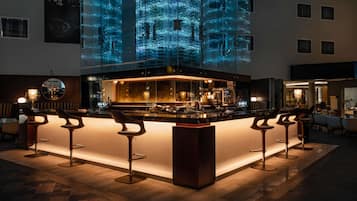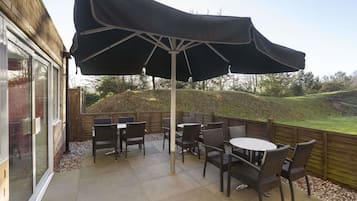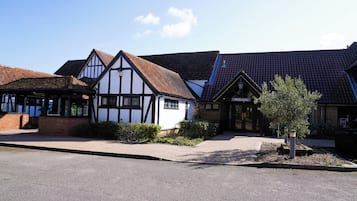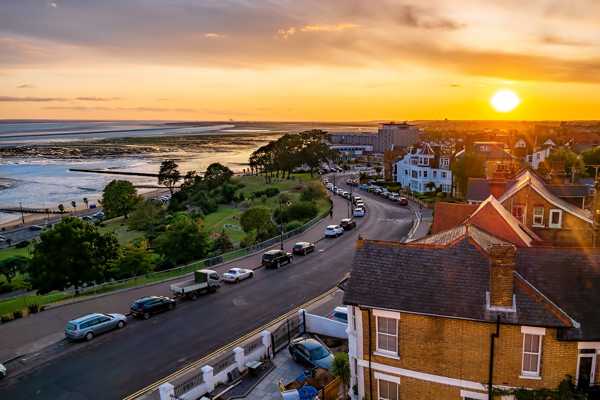Essex has long suffered from an unfair reputation of being a county that’s only saving grace is its proximity to London. But that’s far from the truth. Inland, it boasts castles, stately homes and Tudor mansions, a clue to its long and prosperous history. Colchester is England’s oldest town, once occupied by the Romans. In nearby Cressing, you’ll find ancient barns, one of them the oldest of its kind in the world.
The Essex coastline is second in length only to Cornwall’s. But unlike England’s tourist hotspots, its broad sandy beaches and remote salt marshes are still off the beaten track and often crowd-free. As the driest part of the UK and blessed with plenty of sunshine, the question is not why you should visit, but when. Here’s what to see on an Essex road trip an hour from London.
What are the best things to do in Essex?
- 1
Dedham Vale
Explore the pretty Stour Valley on foot or by boat

- Food
- History
- Photo
Dedham Vale is still recognisable from the paintings of John Constable despite the passing centuries. Though his best-known subjects, Willy Lott’s Cottage and Flatford Mill, are on the Suffolk side of the river, the Area of Outstanding National Beauty extends across the Essex border. The area is easily explored by boat or on foot.
The village of Dedham is conveniently close to the river and boasts a 15th-century church. The attractive High Street boasts several attractive pubs and cafés in its historic buildings, including a branch of the popular Tiptree chain in the 500-year-old Essex Rose Tea House, owned by notable local jam makers Wilkin & Son.
Location: Dedham, Essex, UK
Map - 2
Southend Pier
Jump on the train to the end of the world’s longest pleasure pier

- History
- Photo
Southend Pier claimed its fame as the world’s longest pleasure pier. The round-trip walk from the road is almost 3 miles. Fortunately, for many years, a train has run back and forth, taking the legwork out of a trip to the end of the pier. However, many still choose to walk this breezy structure, passing fishermen hoping for a catch.
Throughout its 190-year history, the disaster-prone pier has experienced several fires. It was even decapitated in bad weather in 1986 by the MV Kingsabbey, a waste disposal tanker which became the 9th vessel to crash into the structure. But this much-loved landmark rises like the mythological phoenix after each setback. Today, historic sailing ships occasionally drop anchor, while pleasure cruises depart regularly from the Pier Head.
Location: Western Esplanade, Southend-on-Sea SS1 2EE, UK
Phone: +44 (0)1702 611214
Map - 3
Mersea Island
Eat oysters at the water’s edge and join a 2000-year-old tradition

- Food
- History
- Photo
Mersea Island has a long tradition of oyster farming. Legend has it the Romans joked the bivalves were the only good thing to have come out of Britain. People still chance the tide on the Strood, the causeway that offers the only road access to the island, to try them at the basic but popular Company Shed.
Though fresh oysters are on sale year-round, the best time to come is at the start of September when the Colchester Natives season begins. Their saltier taste and more intense flavour develop from the tidal mudflats in which they’re found. Unfortunately, that sediment also means you’re highly unlikely to find a pearl.
Location: 129 Coast Road, West Mersea, Colchester CO5 8PA, UK
Open: Tuesday–Saturday from 10 am to 4 pm
Phone: +44 (0)1206 382700
Mapphoto by Editor5807 (CC BY 3.0) modified
- 4
Thaxted
Immerse yourself in history in front of the 14th-century Guildhall

- History
- Photo
Thaxted is home to an impressive array of historic buildings, the most famous of which is the timbered 14th-century Guildhall that dominates the High Street. Built by the Guild of Cutlers, it once survived a terrible fire. Further up Watling Street is the grand parish church of John the Baptist with Our Lady and St. Laurence, begun in 1340.
Down the hill, look out for a blue house bearing a plaque which reminds visitors that it was once the home of composer Gustav Holst. In nearby Stoney Lane, commemorates the infamous highwayman Dick Turpin, though his presence is more legend than fact. You’ll find the restored John Webb windmill a short stroll away, surrounded by the arable fields which characterise this fertile area of the UK.
Location: Thaxted, Dunmow, UK
Map - 5
Bradwell-on-Sea
Hike to a 7th-century stone chapel

- Adventure
- History
- Photo
Bradwell-on-Sea sits on the eastern tip of the Dengie Peninsula, a considerable distance from the county’s larger towns. But a steady stream of walkers makes the pilgrimage out to this coastal spot. They hike across the farm track which leads to the chapel of St Peter-on-the-Wall. This tiny stone chapel was built in 653 AD by St Cedd after he sailed down from Lindisfarne.
Occasional summer services and weddings take place but during the week St Peter-on-the-Wall is left unlocked as a place of meditation and prayer. Originally a Roman fort, neighbouring Othona is now a Christian community welcoming visitors. They’re not the only significant religious buildings in Essex – 40 miles away on the other side of Essex near Epping, you’ll find Greensted Church, the world’s oldest timber church.
Location: Southminster, Essex, UK
Phone: +44 (0)1621 779620
Map - 6
Abberton Reservoir
Birdwatching and bombs define this body of water

- History
- Photo
Abberton is one of 3 reservoirs in Essex and at 4.9 sq km, has the 4th largest surface area of those in England and Wales. It is popular with birdwatchers for its huge variety of native and migrating species, including cormorants, lapwings, black-tailed godwits and great-crested grebes. RSPB Old Hall Marshes site is a short drive away.
The RAF 617 Squadron used Abberton Reservoir during WWII as a practice site for the Dambuster raids. The Layer Causeway stood in for the dam and preparation for Operation Chastise, as it was known, took place under cover of darkness. The reservoir, itself a target, was mined by the MOD and later cleared. Controlled detonations on the last few took place in the 1980s and the site is now officially clear.
Location: The Rows, Church Rd, Layer de la Haye, Colchester CO2 0EU, UK
Phone: +44 (0)1206 738172
Mapphoto by Terryjoyce (CC BY-SA 3.0) modified
- 7
Hadleigh Castle
Gaze out over the Thames from the castle ruins

- Adventure
- History
- Photo
Hadleigh Castle is the most southerly of the Essex palaces. It lies in ruins, though there’s just enough left to imagine how it would have looked when it was first built. The castle dates from the 13th century and was strategically important during the Hundred Years’ War. Picnic on the meadows surrounding the ruins and enjoy views across the Thames while you eat.
A little inland, you’ll find the 2012 Olympics cross-country cycling track. The circuit is now open to the public so borrow a mountain bike and test your mettle on the same ground used by the world’s pros. The 5-km track is accessible to all abilities but detour onto the optional black runs, such as Deanes Drop and The Leap of Faith, only if you’re an experienced rider.
Location: Castle Lane, Hadleigh, Benfleet SS7 2AP, UK
Map - 8
Battlesbridge
Shop for antiques in an old granary barn

- Food
- Photo
- Shoppers
Battlesbridge has a reputation for antiques that extends beyond Essex. The main centre occupies an old granary barn beside the water. Sprawling over 4 floors, it overlooks the River Crouch and was a Victorian addition to the riverside quay where barges once moored up to unload coal and refill with hay and flour.
These days, antique dealers occupy many of the historic buildings in this corner of the village, selling everything from cut glass to upcycled furniture. Two good pubs, The Hawk and The Barge, as well as café on the top floor of the antique centre, offer plenty of choice for a restorative lunch. Just don’t come expecting a battlefield – the village takes its name from the Bataille family who once owned much of the land.
Location: 5 Maltings Rd, Battlesbridge, Wickford SS11 7RF, UK
Open: Daily from 10 am to 5 pm
Phone: +44 (0)1268 769000
Mapphoto by Terryjoyce (CC BY-SA 3.0) modified
- 9
Harwich
Learn about the town’s long maritime history

- Families
- History
- Photo
A quirk of fate led to the long association the port town of Harwich has had with the sea. A storm surge in the 1100s created a deep harbour and a boat-building tradition was born. One of the most famous ships to be constructed here was The Mayflower, which sailed to the USA in 1620. The Port Books of 1609–11 designate the vessel as of Harwich.
Harwich has much to interest the maritime enthusiast, including a Lifeboat Museum. The LV-18 Lightship moored on the quayside close to Ha’Penny Pier is a floating museum devoted to all aspects of pirate radio. Nearby, you’ll find the 1667 Treadwheel Crane, worked by men walking in the interior of 2 large wheels to raise and lower goods and materials. It’s thought to be the only one of its kind in the UK.
Location: Harwich, Essex, UK
Map - 10
The Sunshine Coast
Relax on the beaches or go for seal-watching trips
- Budget
- Families
- Photo
Collectively known as the Sunshine Coast, the north of Essex boasts some of its broadest swathes of sand. Each has a different character. Genteel Frinton and the quiet holiday town of Holland-on-Sea contrast with kiss-me-quick Clacton. The beach at Jaywick, backed by low grassy dunes, is the prettiest of all.
The best all-rounder is Walton-on-the-Naze. The Hanoverian Naze Tower is a popular local landmark – inside this former navigation tower, there’s an art gallery and café. Seal-watching trips depart regularly to visit the common grey seals that hang out in Walton’s backwaters. Their habitat was the setting for Arthur Ransome’s children’s novel, Swallows and Amazons.
Location: Tendring District, Essex, UK
Map



















